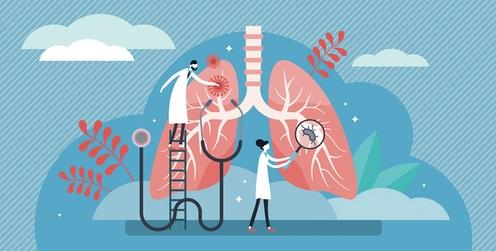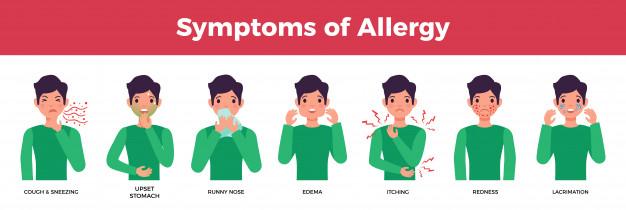Asthma, Allergy & Sleep Medicine
What is Asthma?
Asthma is a disease in which a person’s airways become narrow, inflamed and swell and produce extra mucus that makes it difficult to breathe. A person who is suffering from asthma may also face chest pain, wheezing and cough.

Types of Asthma
Asthma can be of various forms; the following are the types of Asthma:-
1. Allergic asthma
Allergic asthma means the asthma attack or asthma disease to the person who has the allergy from dust, pollen and pet dander.
2. Occupational asthma
The person is having an asthma attack or asthma problem only when he/she is at the workplaces, and then it is said to be occupational asthma.
3. Non-allergic asthma
Non-allergic asthma means when the symptoms of asthma flare up in the winter or summer seasons.
4. Exercise-induced bronchoconstriction
When the asthma problem or asthma attack occurs only when the person involved in physical activity that is said to be exercise-induced, bronchoconstriction
5. Cough variant asthma
When a person is suffering from a severe cough problem, then he may face an asthma attack. Asthma caused due to the cough is said to be cough variant asthma.
6. Nocturnal asthma
Nocturnal asthma is also known as night time asthma. When asthma symptoms get higher during sleep and cause an asthma attack, then it is said to be nocturnal asthma.
Symptoms of Asthma
The symptoms of asthma include the following:-
- ● Wheezing
- ● Coughing
- ● A tight chest
- ● Breathlessness
Treatment for Asthma
The treatment of asthma may include the following-
- A person may use inhalers, medication, injection, surgery and complementary therapies.
1. Inhaler
Inhalers are the tools that prevent you from asthma. Inhalers are of 3 types.
i. Reliever inhaler
A reliever inhaler is blue. This inhaler is used to treat the symptoms of asthma when they occur. A reliever inhaler provides you relief from asthma within 5 minutes.
The side effects of using reliever inhalers are:-
- ● Fast heartbeat
- ● Shaking
ii. Preventer inhaler
A preventer inhaler is used to prevent the person from the symptoms of asthma. Preventive inhalers contain steroid medicine. A preventer inhaler is used to reduce the sensitivity and inflammation of the airways. A person might face the side effects after using a preventer inhaler are as follows:-
- ● A fungal infection
- ● Sore throat
- ● Hoarse voice
iii. Combination inhaler
A combination inhaler, as named, suggests the combination of preventer and reliever inhaler.
A combination inhaler is used when the preventer or reliever inhaler fails to control asthma. A combination inhaler performs the function of both reliever and preventer inhalers.
The side effects of using a combination inhaler are:-
- ● A sore throat
- ● Fast heart-beat
- ● A hoarse voice
- ● Shaking
- ● Fungal infection
2. Medication
Medication can also be used to cure asthma disease. The following are some prescribed medicine to prevent or get relief from asthma:-
- ● Theophylline
- ● Leukotriene receptor
- ● Steroid tablets
NOTE take medicine only after your doctor suggests.
3. Surgery
A procedure called bronchial thermoplasty is done to cure severe asthma. Anaesthesia is given to the person for further treatment. A surgeon will pass a flexible, thin tube down the throat and to the lungs. To stop the narrowing of muscles around the airways the heat is used. This process is used to prevent asthma.
4. Complementary therapies
Various complementary therapies are provided to prevent asthma.
The following are the complimentary services as follows:-
- ● Acupuncture
- ● Homoeopathy
- ● Breathing exercise
- ● Manual therapies
- ● Dietary supplement
- ● Ionisers

Allergy
An allergy is an immune system response to allergens. Allergens are foreign substances that can be pollen, foods or pet dander.
Our immune system function is to keep our body healthy by fighting harmful pathogens.
Types of allergy
There are certain types of allergies, and that is as follows
1. Food allergy when the person has an allergy by eating or smelling any specific food particle is called food allergy.
2. Insect allergy wasps, hornets, yellow jackets, fire ants and bees cause allergic reactions in people.
3. Latex allergy A latex allergy is caused to a person due to the use of latex-containing products. Natural rubber latex gloves and balloons contain latex.
4. Drug allergy: drug allergy that occurs when a specific drug causes an allergic reaction to the person. The use of a particular drug can have the opposite reaction to the body that leads to allergy.
5. Pollen allergy an allergic reaction caused by pollen in seasons called pollen allergy.
6. Pet allergy An allergic reaction to the person by the hairs or fur of a pet is called pet allergy.
Symptoms of various allergy
The following are some symptoms of allergy.
Food allergy
- ● Tingling in the mouth
- ● Hives
- ● Swelling to the lips
- ● Anaphylaxis
Insect allergy
- ● Itching
- ● Cough
- ● Chest tightness
- ● Shortness of breath
- ● Swelling at the sting site
- ● Wheezing
Drug allergy
- ● Rash
- ● Facial swelling
- ● Itchy skin
- ● Wheezing
- ● Hives
Prevention to allergy
The following are some prevention tips to prevent allergy
- ● Take your daily medicine as prescribed by your doctor
- ● Avoid your allergens
- ● Always keep epinephrine with you, if you are suffering from anaphylaxis
- ● Take proper information to know what steps can be taken for an allergic reaction.
Sleep Medicine
Sleep medicine is basically a drug given to patients who are suffering from a sleep disorder or insomnia. Sleep medicine is a sleeping pill that used to make a person fall asleep. Consuming too many sleeping pills can lead to many health issues.
There are various types of sleep medicine available.

Sleep medicine causes
Sleep medicine can cause the following:-
- ● Changes in appetite
- ● Diarrhoea
- ● Constipation
- ● Weakness
- ● Uncontrollable shaking
- ● Heartburn
- ● Decrease the efficiency of mind
- ● Stomach pain
- ● Slow thinking
- ● Dry throat
- ● Gas
- ● Headache
- ● Dizziness
Side effects of sleeping pill
The following are the side effects of taking sleeping pills regularly.
- ● Hives
- ● Difficulty in breathing
- ● Hoarseness
- ● Itching
- ● Chest pain
- ● Blurred vision
- ● Nausea
- ● Rashes
- ● Vomiting
- ● Swelling is eyes, lips, face and throat etc
Safety tips for using sleeping pills
There are specific tips that should be considered while taking sleep medicine. The following are the tips to use sleep medicine safely.
- ● Do not drink alcohol before and after using the medication
- ● Never take sleep medicine without a doctor’s permission.
- ● Do not go for a ride after taking a sleeping pill.
- ● If any complication happens after taking the sleeping pill, then consult the doctor.
- ● Do not operate any heavy machinery after taking the sleep medicine.